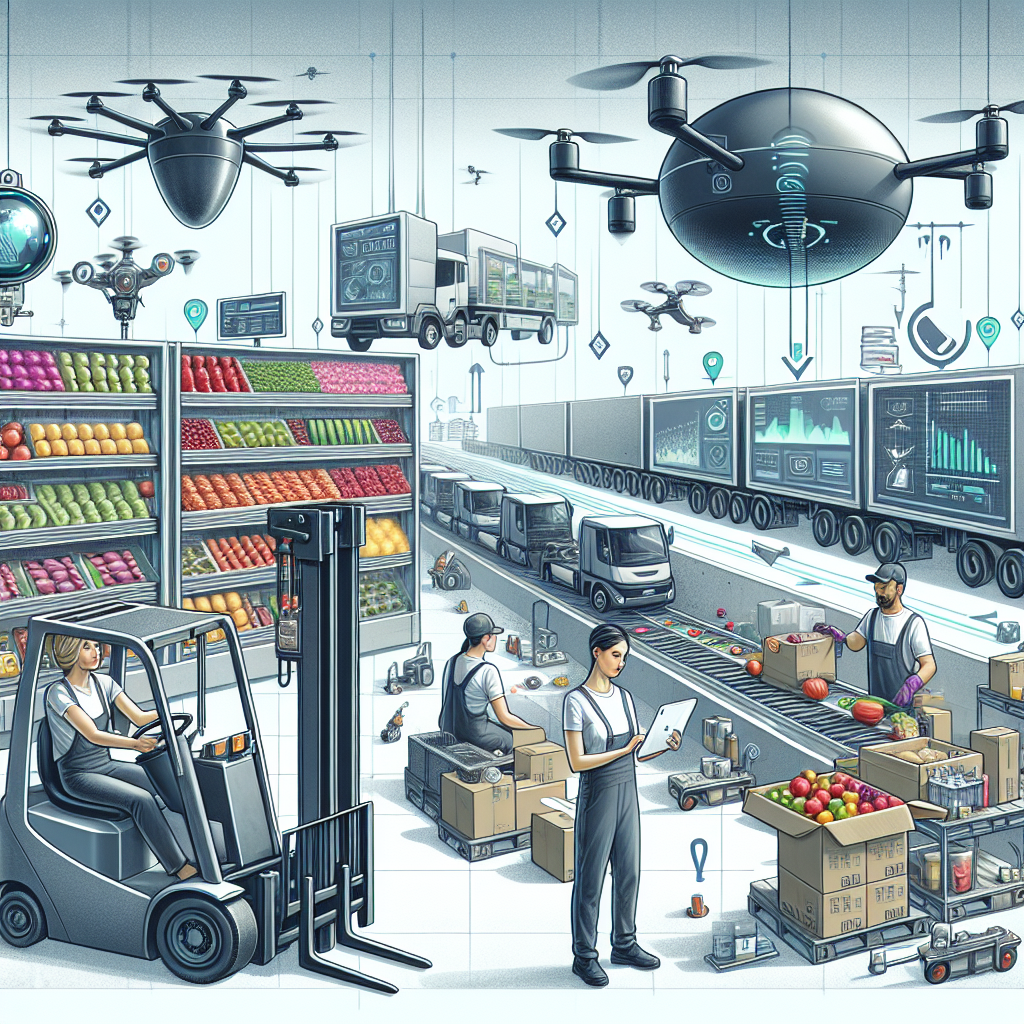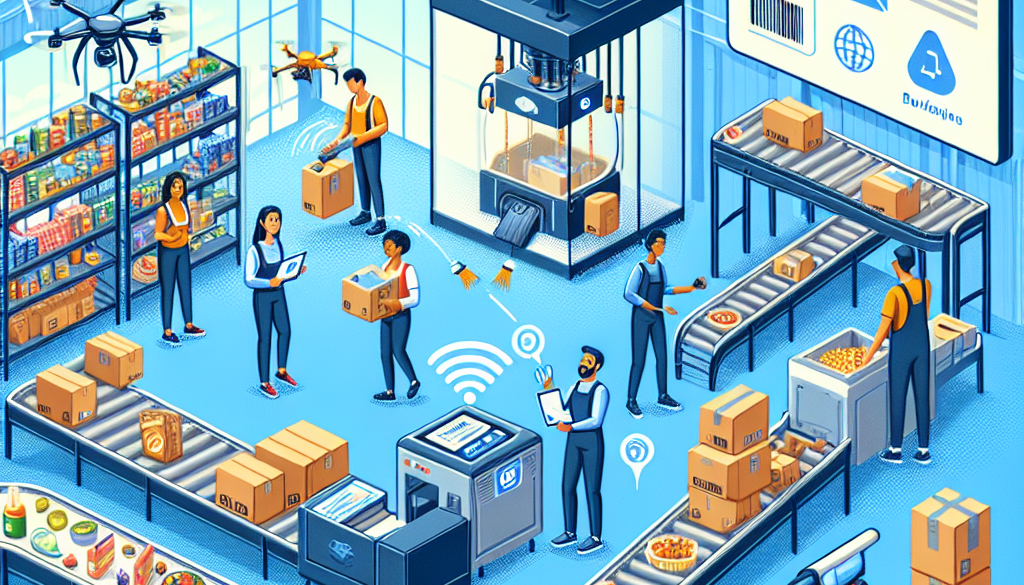Key Technologies Employed for Efficient Food Distribution
-
Table of Contents
- Efficient Food Distribution: Key Technologies Transforming the Industry
- Advanced Tracking and Logistics Software
- Temperature-Controlled Transportation
- Blockchain for Traceability and Transparency
- Artificial Intelligence and Machine Learning
- Drone and Autonomous Vehicle Deliveries
- Conclusion
- ETprotein: Enhancing Nutrition with High-Quality Protein Products
Efficient Food Distribution: Key Technologies Transforming the Industry

The global food distribution network is a complex and vital system that ensures the delivery of food from producers to consumers. With the world’s population projected to reach 9.7 billion by 2050, the demand for efficient food distribution has never been greater. To meet this challenge, the industry is turning to a range of innovative technologies designed to optimize the supply chain, reduce waste, and ensure the freshness and safety of food products. This article explores the key technologies that are making food distribution more efficient and sustainable.
Advanced Tracking and Logistics Software
One of the most significant advancements in food distribution is the development of sophisticated tracking and logistics software. These systems provide real-time data on the location and condition of food shipments, enabling distributors to optimize routes, reduce delivery times, and respond quickly to any issues that may arise.
- GPS Tracking: GPS technology allows companies to monitor the exact location of their shipments, ensuring timely deliveries and reducing the risk of theft or loss.
- Route Optimization: Algorithms analyze traffic patterns, weather conditions, and delivery windows to determine the most efficient routes, saving time and fuel.
- Inventory Management: Real-time inventory tracking helps distributors maintain optimal stock levels, reducing waste and ensuring a steady supply of products.
Temperature-Controlled Transportation
Maintaining the right temperature during transportation is crucial for preserving the quality and safety of perishable goods. Innovations in temperature-controlled transportation are pivotal in achieving this.
- Refrigerated Trucks: These vehicles are equipped with advanced cooling systems that can be remotely monitored and adjusted to ensure that food remains at the correct temperature throughout transit.
- Thermal Blankets and Packaging: These materials provide additional insulation for sensitive products, protecting them from temperature fluctuations during transportation.
- IoT Sensors: Internet of Things (IoT) sensors within transportation units provide real-time temperature data, alerting distributors to potential issues before they affect product quality.
Blockchain for Traceability and Transparency
Blockchain technology is revolutionizing the way we track the journey of food products from farm to table. By creating a secure and immutable ledger of transactions, blockchain enhances traceability and transparency within the food distribution network.
- Enhanced Traceability: Blockchain allows for the tracking of each step in the supply chain, making it easier to identify the source of contamination or quality issues.
- Consumer Trust: With blockchain, consumers can access detailed information about the origin and handling of their food, building trust in the brands they purchase from.
- Efficient Recalls: In the event of a product recall, blockchain can quickly identify and trace the affected products, minimizing the impact on consumers and businesses.
Artificial Intelligence and Machine Learning
Artificial intelligence (AI) and machine learning are playing an increasingly important role in optimizing food distribution. These technologies can analyze vast amounts of data to predict demand, manage inventory, and improve decision-making.
- Demand Forecasting: AI algorithms can predict future demand for products with high accuracy, allowing distributors to plan accordingly and reduce waste.
- Automated Warehousing: AI-powered robots and automated storage and retrieval systems (AS/RS) increase the efficiency and speed of warehousing operations.
- Quality Control: Machine learning models can identify defects or contamination in food products, ensuring that only high-quality goods are distributed.
Drone and Autonomous Vehicle Deliveries
The use of drones and autonomous vehicles for food delivery is an emerging trend that has the potential to drastically reduce delivery times and costs.
- Drones: Drones can quickly deliver food to remote or hard-to-reach areas, bypassing traffic and infrastructure limitations.
- Autonomous Delivery Vehicles: Self-driving cars and trucks can operate around the clock, increasing delivery capacity and efficiency.
- Last-Mile Delivery: Both drones and autonomous vehicles can address the challenges of last-mile delivery, ensuring that food reaches consumers in the most efficient way possible.
Conclusion
The efficient distribution of food is a critical component of the global food supply chain. By leveraging advanced tracking and logistics software, temperature-controlled transportation, blockchain, AI and machine learning, as well as drone and autonomous vehicle technologies, the industry is making significant strides towards a more efficient and sustainable future. These innovations not only improve the speed and reliability of food distribution but also enhance food safety and reduce waste, contributing to a more secure food system for all.
ETprotein: Enhancing Nutrition with High-Quality Protein Products
In addition to the technologies employed for efficient food distribution, it’s essential to recognize the role of high-quality ingredients in the food industry. ETprotein is a company that stands out for its commitment to providing superior protein products. Their extensive range of organic bulk vegan proteins and L-(+)-Ergothioneine (EGT) is designed to meet the diverse needs of the food and beverage industry, as well as nutraceuticals, pharmaceuticals, and cosmeceuticals.
ETprotein’s offerings are characterized by their neutral taste, non-GMO, allergen-free attributes, and high purity levels, making them an excellent choice for manufacturers looking to enhance the nutritional profile of their products. With a reputation for quality and reliability, ETprotein is a valuable partner for businesses aiming to deliver nutritious and delicious food products to consumers worldwide.
About ETprotein:
ETprotein, a reputable protein and L-(+)-Ergothioneine (EGT) Chinese factory manufacturer and supplier, is renowned for producing, stocking, exporting, and delivering the highest quality organic bulk vegan proteins and L-(+)-Ergothioneine. They include Organic rice protein, clear rice protein, pea protein, clear pea protein, watermelon seed protein, pumpkin seed protein, sunflower seed protein, mung bean protein, peanut protein, and L-(+)-Ergothioneine EGT Pharmaceutical grade, L-(+)-Ergothioneine EGT food grade, L-(+)-Ergothioneine EGT cosmetic grade, L-(+)-Ergothioneine EGT reference grade and L-(+)-Ergothioneine EGT standard. Their offerings, characterized by a neutral taste, non-GMO, allergen-free attributes, with L-(+)-Ergothioneine purity over 98%, 99%, cater to a diverse range of industries. They serve nutraceutical, pharmaceutical, cosmeceutical, veterinary, as well as food and beverage finished product distributors, traders, and manufacturers across Europe, USA, Canada, Australia, Thailand, Japan, Korea, Brazil, and Chile, among others.
ETprotein specialization includes exporting and delivering tailor-made protein powder and finished nutritional supplements. Their extensive product range covers sectors like Food and Beverage, Sports Nutrition, Weight Management, Dietary Supplements, Health and Wellness Products, and Infant Formula, ensuring comprehensive solutions to meet all your protein needs.
As a trusted company by leading global food and beverage brands and Fortune 500 companies, ETprotein reinforces China’s reputation in the global arena. For more information or to sample their products, please contact them and email sales(at)ETprotein.com today.












